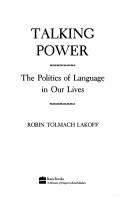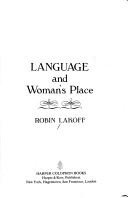| Listing 1 - 10 of 27 | << page >> |
Sort by
|

ISBN: 0520222962 Year: 2000 Publisher: Berkeley, Calif. University of California Press
Abstract | Keywords | Export | Availability | Bookmark
 Loading...
Loading...Choose an application
- Reference Manager
- EndNote
- RefWorks (Direct export to RefWorks)
Psycholinguistics --- Sociolinguistics --- United States --- Mass media and language --- Power (Social sciences) --- United States of America

ISBN: 0465083595 0465083587 9780465083589 9780465083596 Year: 1992 Publisher: Glasgow Harper Collins
Abstract | Keywords | Export | Availability | Bookmark
 Loading...
Loading...Choose an application
- Reference Manager
- EndNote
- RefWorks (Direct export to RefWorks)
Entertains and informs us about the persuasive strategies of communication, exposing the false dichotomy between style and substance and empowering us to become better language consumers.
Language and languages --- #gsdbF --- Political aspects. --- Psycholinguistics --- Sociolinguistics --- Political aspects --- Language and languages Political aspects --- Langage et langues --- Aspect politique --- Langues

ISBN: 0060903899 Year: 1975 Publisher: New York, N.Y. Harper Colophon Books
Abstract | Keywords | Export | Availability | Bookmark
 Loading...
Loading...Choose an application
- Reference Manager
- EndNote
- RefWorks (Direct export to RefWorks)
316:80 --- English language --- -Sex role --- Sexism in language --- Women --- -Human females --- Wimmin --- Woman --- Womon --- Womyn --- Females --- Human beings --- Femininity --- Sexist language --- Language and sex --- Language and languages --- Nonsexist language --- Gender role --- Sex (Psychology) --- Sex differences (Psychology) --- Social role --- Gender expression --- Sexism --- Germanic languages --- Sociologie --(algemeen)-:-?80 --- Sex differences --- Language --- Sex role. --- Sexism in language. --- Sex differences. --- Language. --- 316:80 Sociologie --(algemeen)-:-?80 --- -Sociologie --(algemeen)-:-?80 --- -Sexist language --- Human females --- Psycholinguistics --- Sociolinguistics --- Sociology of the family. Sociology of sexuality --- Sex role --- Social aspects --- Gender roles --- Gendered role --- Gendered roles --- Role, Gender --- Role, Gendered --- Role, Sex --- Roles, Gender --- Roles, Gendered --- Roles, Sex --- Sex roles --- Language use --- Linguistic sexism --- Book
Article
Publisher: S.l. : s.n.,
Abstract | Keywords | Export | Availability | Bookmark
 Loading...
Loading...Choose an application
- Reference Manager
- EndNote
- RefWorks (Direct export to RefWorks)
Book
Year: 1968 Publisher: Cambridge, Mass. MIT
Abstract | Keywords | Export | Availability | Bookmark
 Loading...
Loading...Choose an application
- Reference Manager
- EndNote
- RefWorks (Direct export to RefWorks)

ISBN: 902725382X 9786612156403 1282156403 9027294119 9789027294111 9781282156401 9789027253828 Year: 2005 Publisher: Amsterdam Benjamins
Abstract | Keywords | Export | Availability | Bookmark
 Loading...
Loading...Choose an application
- Reference Manager
- EndNote
- RefWorks (Direct export to RefWorks)
This collection of 19 papers celebrates the coming of age of the field of politeness studies, now in its 30th year. It begins with an investigation of the meaning of politeness, especially linguistic politeness, and presents a short history of the field of linguistic politeness studies, showing how such studies go beyond the boundaries of conventional linguistic work, incorporating, as they do, non-language insights. The emphasis of the volume is on non-Western languages and the ways linguistic politeness is achieved with them. Many, if not most, studies have focused on Western languages, but the languages highlighted here show new and different aspects of the phenomena.The purpose of linguistic politeness is to aid in successful communication throughout the world, and this volume offers a balance of geographical distribution not found elsewhere, including Japanese, Thai, and Chinese, as well as Greek, Swedish and Spanish. It covers such theoretical topics as face, wakimae, social levels, gender-related differences in language usage, directness and indirectness, and intercultural perspectives.
Grammar, Comparative and general --- Politeness (Linguistics). --- Honorific. --- Stilistics --- Pragmatics --- 801.56 --- 801.56 Syntaxis. Semantiek --- Syntaxis. Semantiek --- Politeness (Linguistics) --- Courtesy (Linguistics) --- Linguistics --- Honorific --- Polite form --- Philology --- Grammar, Comparative and general Honorific

ISBN: 9786612355905 0520928075 1282355902 1597347019 9780520928077 0585389888 9780585389882 0520232070 9780520232075 9781597347013 0520222962 9780520222960 0520216660 9780520216662 6612355905 9781282355903 Year: 2000 Publisher: Berkeley University of California Press
Abstract | Keywords | Export | Availability | Bookmark
 Loading...
Loading...Choose an application
- Reference Manager
- EndNote
- RefWorks (Direct export to RefWorks)
Robin Lakoff gets to the heart of one of the most fascinating and pressing issues in American society today: who holds power and how they use it, keep it, or lose it. In a brilliant and vastly entertaining discussion of news events that have occupied an enormous amount of media space--political correctness, the Anita Hill/Clarence Thomas hearings, Hillary Rodham Clinton as First Lady, O. J. Simpson's murder trial, the Ebonics controversy, and the Clinton sex scandal--Lakoff shows that the struggle for power and status at the end of the century is being played out as a war over language. Controlling language is a basis for all power, she says, and therefore it is worth fighting for. As a result, newly emergent groups, especially blacks and women, are contending with middle- to upper-class white men for a share in "language rights." Lakoff's introduction to linguistic theories and the philosophy of language lays the groundwork for an exploration of news stories that meet what she calls the UAT (Undue Attention Test). As the stories became the subject of talk-show debates, late-night comedy routines, Web sites, and magazine articles, they were embroidered with additional meanings, depending on who was telling the story. Race, gender, or both are at the heart of these stories, and each one is about the right to construct meanings from language in short, to possess power. Because language tells us how we are connected to one another, who has power and who does not, the stories reflect the language war. We use language to analyze what we call "reality," the author argues, but we mistrust how language is used today--witness the "politics of personal destruction" following the Clinton impeachment. Yet Lakoff sees in the struggle over language a positive goal: equality in the creation of our national discourse. Her writing is accessible and witty, and her excerpts from the media are used to great effect.
Sociolinguistics --- Mass media and language --- Power (Social sciences) --- Language and mass media --- Language and languages --- United States --- ABŞ --- ABSh --- Ameerika Ühendriigid --- America (Republic) --- Amerika Birlăshmish Shtatlary --- Amerika Birlăşmi Ştatları --- Amerika Birlăşmiş Ştatları --- Amerika ka Kelenyalen Jamanaw --- Amerika Qūrama Shtattary --- Amerika Qŭshma Shtatlari --- Amerika Qushma Shtattary --- Amerika (Republic) --- Amerikai Egyesült Államok --- Amerikanʹ Veĭtʹsėndi︠a︡vks Shtattnė --- Amerikări Pĕrleshu̇llĕ Shtatsem --- Amerikas Forenede Stater --- Amerikayi Miatsʻyal Nahangner --- Ameriketako Estatu Batuak --- Amirika Carékat --- AQSh --- Ar. ha-B. --- Arhab --- Artsot ha-Berit --- Artzois Ha'bris --- Bí-kok --- Ē.P.A. --- EE.UU. --- Egyesült Államok --- ĒPA --- Estados Unidos --- Estados Unidos da América do Norte --- Estados Unidos de América --- Estaos Xuníos --- Estaos Xuníos d'América --- Estatos Unitos --- Estatos Unitos d'America --- Estats Units d'Amèrica --- Ètats-Unis d'Amèrica --- États-Unis d'Amérique --- Fareyniḳṭe Shṭaṭn --- Feriene Steaten --- Feriene Steaten fan Amearika --- Forente stater --- FS --- Hēnomenai Politeiai Amerikēs --- Hēnōmenes Politeies tēs Amerikēs --- Hiwsisayin Amerikayi Miatsʻeal Tērutʻiwnkʻ --- Istadus Unidus --- Jungtinės Amerikos valstybės --- Mei guo --- Mei-kuo --- Meiguo --- Mî-koet --- Miatsʻyal Nahangner --- Miguk --- Na Stàitean Aonaichte --- NSA --- S.U.A. --- SAD --- Saharat ʻAmērikā --- SASht --- Severo-Amerikanskie Shtaty --- Severo-Amerikanskie Soedinennye Shtaty --- Si︠e︡vero-Amerikanskīe Soedinennye Shtaty --- Sjedinjene Američke Države --- Soedinennye Shtaty Ameriki --- Soedinennye Shtaty Severnoĭ Ameriki --- Soedinennye Shtaty Si︠e︡vernoĭ Ameriki --- Spojené staty americké --- SShA --- Stadoù-Unanet Amerika --- Stáit Aontaithe Mheiriceá --- Stany Zjednoczone --- Stati Uniti --- Stati Uniti d'America --- Stâts Unîts --- Stâts Unîts di Americhe --- Steatyn Unnaneysit --- Steatyn Unnaneysit America --- SUA (Stati Uniti d'America) --- Sŭedineni amerikanski shtati --- Sŭedinenite shtati --- Tetã peteĩ reko Amérikagua --- U.S. --- U.S.A. --- United States of America --- Unol Daleithiau --- Unol Daleithiau America --- Unuiĝintaj Ŝtatoj de Ameriko --- US --- USA --- Usono --- Vaeinigte Staatn --- Vaeinigte Staatn vo Amerika --- Vereinigte Staaten --- Vereinigte Staaten von Amerika --- Verenigde State van Amerika --- Verenigde Staten --- VS --- VSA --- Wááshindoon Bikéyah Ałhidadiidzooígíí --- Wilāyāt al-Muttaḥidah --- Wilāyāt al-Muttaḥidah al-Amirīkīyah --- Wilāyāt al-Muttaḥidah al-Amrīkīyah --- Yhdysvallat --- Yunaeted Stet --- Yunaeted Stet blong Amerika --- ZDA --- Združene države Amerike --- Zʹi︠e︡dnani Derz︠h︡avy Ameryky --- Zjadnośone staty Ameriki --- Zluchanyi︠a︡ Shtaty Ameryki --- Zlucheni Derz︠h︡avy --- ZSA --- Η.Π.Α. --- Ηνωμένες Πολιτείες της Αμερικής --- Америка (Republic) --- Американь Вейтьсэндявкс Штаттнэ --- Америкӑри Пӗрлешӳллӗ Штатсем --- САЩ --- Съединените щати --- Злучаныя Штаты Амерыкі --- ولايات المتحدة --- ولايات المتّحدة الأمريكيّة --- ولايات المتحدة الامريكية --- 미국 --- Languages --- Political aspects. --- Spojené obce severoamerické --- #SBIB:012.AANKOOP --- #SBIB:309H518 --- Verbale communicatie: sociologie, antropologie, sociolinguistiek --- États-Unis --- É.-U. --- ÉU --- Language and culture --- Linguistics --- Sociology --- Integrational linguistics (Oxford school) --- african american. --- american history. --- american society. --- anita hill. --- clarence thomas. --- contemporary america. --- discourse. --- ebonics. --- gender. --- government. --- language. --- law and order. --- legal issues. --- media. --- modern america. --- modern american. --- modern society. --- modern world. --- murder trial. --- news. --- oj simpson. --- political correctness. --- politics. --- pop culture. --- power. --- race. --- racism. --- reality. --- sex scandal. --- trials. --- united states history. --- us history. --- womens issues. --- womens studies.
Book
Year: 1968 Publisher: Cambridge: MIT Press,
Abstract | Keywords | Export | Availability | Bookmark
 Loading...
Loading...Choose an application
- Reference Manager
- EndNote
- RefWorks (Direct export to RefWorks)
Book
Year: 1968 Publisher: Cambridge (Mass.) : M.I.T. Press,
Abstract | Keywords | Export | Availability | Bookmark
 Loading...
Loading...Choose an application
- Reference Manager
- EndNote
- RefWorks (Direct export to RefWorks)
Latin language --- Syntax. --- Complement.
Book
Year: 1968 Publisher: Cambridge (Mass.) MIT Press
Abstract | Keywords | Export | Availability | Bookmark
 Loading...
Loading...Choose an application
- Reference Manager
- EndNote
- RefWorks (Direct export to RefWorks)
| Listing 1 - 10 of 27 | << page >> |
Sort by
|

 Search
Search Feedback
Feedback About UniCat
About UniCat  Help
Help News
News